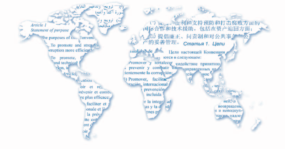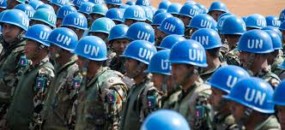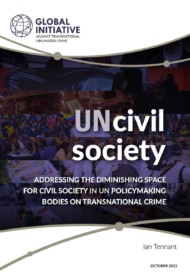Posted on 02 Nov 2018
After years of disagreements, the Conference of the Parties to the UN Convention against Transnational Organized Crime finally established a review mechanism to the convention during its meeting in Vienna from 15 to 19 October.
Several members of the Global Initiative Against Transnational Organized Crime (Global Initiative) have been monitoring progress on and engaging with the UN Convention against Transnational Organized Crime (UNTOC) for two decades. One of our number, Peter Gastrow, served as a rapporteur during the original negotiations. We have, in a recent commentary, been critical of the ongoing failure to establish a review mechanism. Our most recent story, published just before the Conference of the Parties (COP) got underway, suggested that there was a renewed commitment to establishing the review mechanism – a sentiment that proved accurate, as it turned out.
There is little doubt that concluding a review mechanism is a hard-won achievement, and consensus for it has remained elusive in previous conference sessions. The result, however, is a clearly a compromise that has both strengths and several glaring weaknesses. Our view remains that it is better, including for civil society, that the review mechanism has been passed. Nevertheless, we are also aware that civil society must now engage with what is a flawed mechanism to show its utility to the process in the longer term while seeking to hold states and the process as a whole to account.
The (admittedly expected) weak provision for civil-society involvement in the new mechanism – encompassing everything from non-governmental organizations to academia, private-sector and community groups – is a cause for concern, as civil society provides a crucial independent voice in the fight against organized crime. Moving forward, innovative thinking from civil society is needed to ensure their voices are not lost. We must tackle important questions as to what in fact is ‘civil society’ in the space of the debate on countering organized crime, how it can get more engaged as the review mechanism unfolds, and what UNTOC aims to achieve as an international instrument.
A step forward?
Review mechanisms for international conventions, such as that negotiated for UNTOC, serve to give a convention life: they provide the system whereby countries’ performance on meeting their obligations under the convention can be assessed, and collate information on the international community’s overall progress. As analysis from Transparency International on the review mechanism for the UN Convention against Corruption (UNCAC) puts it, ‘a convention without a review mechanism and follow-up action is akin to a football game without a referee or scores’. Sadly, however, this is precisely the kind of game the UNTOC states parties have been playing in the absence of a mechanism since the convention was first agreed in 2000.
There is widespread perception among Vienna diplomats that the future success of UNTOC as an international instrument is closely tied to the success of its review mechanism. The attempt to reach consensus at COP 2018 was seen as a case of ‘now or never’. One delegate, pleased with the outcome, informed us that the review mechanism would ‘revitalize’ the conference and its associated working groups. From this perspective, the review mechanism – in whatever form – is a useful diplomatic tool.
Yet even this round of negotiations would not have been successful without the particular intervention of Italy and the key role played by the Italian ambassador and her staff. Discussions between the US and Russia were also critical (and, here, we understand the influence of UNODC leader Yury Fedotov, was key); these were just part of a number of talks between various actors striving to settle their differences. Yet the leadership shown by the Italians served to prove how the efforts of one country can still be critical to building consensus – all the more symbolic given that the negotiation and signing of the convention took place in Palermo, Sicily, in the wake of a mafia assassination campaign two decades ago.
However, a more critical – yet incontrovertible – sentiment towards the review mechanism has also been voiced: that this step has been taken only after nearly 20 years of procrastination. The text of the convention itself envisages the review mechanism and mandates the COP to establish it, and although discussions about the mechanism emerged at the very first COP session they have been moving at a snail’s pace ever since. By this measure, the mechanism, as it has eventually emerged, can be seen not so much as a step forward than as a sign that states parties are only finally shouldering the responsibility they have been abrogating for many years.
The highly political nature of the review process – which is essentially a judgement on states’ compliance on the sensitive issue of tackling organized crime – has thwarted previous attempts to reach consensus (along with more prosaic issues, such as budgeting, which stymied the 2012 negotiations). The paradox is that, from a national security perspective, states stand to benefit from a thorough review of the counter-organized-crime work of their peers, whether these be neighbouring or otherwise strategically important states. Yet a critical few do not welcome such scrutiny themselves.
What was finally agreed in the review mechanism?
As we have covered in previous instalments of UNTOC Watch, key previous sticking points have been the scope and structure of the review mechanism, sources of funding and the role of civil society.
The agreed mechanism, described as an ‘intergovernmental process’, is primarily legalistic in nature, entailing a general review undertaken by the plenary of the COP to allow for the exchange of experiences and challenges in implementing the convention, and country reviews. The country review involves a self-assessment stage, followed by a desk-based peer review from two other states parties. Country visits, such as those conducted under the Universal Periodic Review (UPR) of the UN Declaration and Charter on Human Rights, and the UNCAC review mechanism (albeit only with consent of the reviewed state), will not take place. Financial constraints were in part cited for this decision. The outcome reports of the country reviews will be submitted to the thematic working groups of the COP – which cover trafficking in persons, smuggling of migrants, firearms, international cooperation and technical assistance.
In terms of funding, only funds already allocated to the UNTOC COP will be disbursed to directly support the mechanism, with the option for states to allocate additional voluntary contributions. This was changed from broader UNODC funding support – a move influenced by the US, UK, Japan and, to a certain extent, Canada, which aimed to stem any increase in states’ overall UN budget contributions.
After much back and forth in negotiations leading up to the COP session, a limited compromise was reached on the role that civil society should play in the review process. Three main areas for fairly limited civil-society participation have been assigned. First, at the self-assessment stage, states parties are ‘encouraged’ to consult with all relevant stakeholders, including NGOs and academia, private-sector representatives and others. Civil-society groups are also offered the opportunity to take part in a ‘constructive dialogue’ (a newly coined term) convened at the thematic working groups of the UNTOC COP. A panel of representatives from civil-society groups, including NGOs, may be arranged by the UNODC to share independent views on the review process. Reports from these dialogues will then be made available to the working groups at following sessions, to ensure communication between member states and civil-society representatives. Finally, civil-society groups will be able to participate in and make oral statements at the ‘general review’ track of the mechanism, taking place at the COP.
This outcome, seen as a compromise for civil society’s role, was brought about through pressure applied by Russia and China in particular, which engaged constructively but had clear red lines for negotiations. Egypt similarly took a hard line, while Malaysia, Cuba, South Africa and Singapore were also in the conservative camp when it came to civil society’s involvement. Norway pushed for more robust civil-society participation with support from Switzerland. In the final days of negotiation, the Norwegians and Swiss lobbied for at least an expanded role for civil society within the working groups and the freedom to name specific countries. But to no avail. There were wider fears that this would break the fragile consensus, so even EU countries who are generally seen to be supportive of civil society balked at pushing the envelope. According to one delegate, the EU countries were ‘silent on civil society, apart from the Netherlands and the UK’, with support from the US.
At least some of the pushback against greater civil-society involvement was expressed in the argument that there was no ‘cohesive’ civil-society community around organized crime. For proponents of this view, the landscape is too ‘fragmented’ among groups working on specific organized crime issues, such as migrant smuggling. This criticism is a misguided one. Civil society working on organized crime in its broad sense – as defined under the UNTOC itself – is naturally fragmented, compared even to similar stakeholders working in the area of corruption or human rights. The myriad forms organized crime takes means that interested civil-society parties range from expert researchers in topics as diverse as human trafficking and cybercrime, to organizations supporting victims, community groups, and advocacy, academia, journalism and private-sector representatives from almost every industry. Civil society by its nature is seldom ‘cohesive’, as it is actively engaged across a spectrum of issues and places.
What role for civil society?
Member state representatives involved in the negotiations have uniformly expressed optimism about the agreed compromise on civil-society involvement in the review mechanism. Although it was admitted that the absence of country visits could be seen as limiting the input into country reviews, delegates extolled the virtues of the ‘constructive dialogues’. One delegate described the agreement as ‘at least a little bit groundbreaking’, another as a previously ‘unthinkable’ opportunity that civil society must now seize.
The mechanism establishes, a regular and mandatory form of engagement between states and civil society to discuss, following the conclusions of the thematic working groups’ sessions, the implementation of the convention and where improvements need to be made. By comparison, under the UNCAC review mechanism civil-society briefings are held at the margins of the implementation review group, the inter-governmental body charged with overseeing the UNCAC implementation review mechanism.
The constructive dialogues also, for the first time, expressly provide for input from the private sector on the implementation of UNTOC – a unique provision among international review processes. Since industry is a major civil-society player when it comes to responding to many forms of organized crime – see, for example, the Global Initiative’s RESPECT project, which aims to engage private-sector actors on human trafficking – these dialogues provide a major new framework for their engagement.
However, as always with such processes, the devil is in the detail. The so-called constructive dialogues will take place only after the working-group sessions have concluded and after their reports have been adopted, which calls into question what these dialogues are intended to achieve in substance. The dialogues are also limited in scope, as the resolution stipulates that ‘no specific country situation shall be mentioned … except that a country under review may voluntarily raise matters related solely to its own review’. This measure can only serve to thwart attempts by civil society to hold a rigorous and frank discussion on states’ implementation of UNTOC and wider efforts on organized crime, and will be effective in stifling critical voices. While credit is due to the delegates whose negotiations brought about this mechanism, it is difficult from a civil-society perspective to fully share the optimism that these dialogues will truly be ‘constructive’.
The aim of UNTOC
When discussing the UNTOC review mechanism, the human rights UPR is often cited as a comparative example, as is the UNCAC review mechanism. The UPR provides for wide-ranging civil-society involvement in country reviews on human rights issues, including, for example, NGO contributions to a report by ‘other stakeholders’ as part of the country review. This mandatory role for civil society enshrines the principle that a wide range of voices must be heard to effectively monitor a state’s protection of human rights.
From our observations of the UNTOC COP negotiations, it has long been clear that a similar, substantive provision for civil society was never seriously on the table for this review mechanism. In the words of one delegate, ‘getting anything stronger than this would have been extraordinary, given how tough some countries are against any kind of civil-society involvement whatsoever’. This has especially been the case since the establishment of the UNCAC review in 2009, which has little mandatory role for civil society but some flexibility for formal input and consultations. This set a threshold that many member states were unwilling to cross. Discussions with diplomats in Vienna in the run-up to the UNTOC COP session reiterated the notion that there had to be a degree of realism to the negotiations on this point, and a UPR-type model was not to be seriously considered.
Interestingly, a number of delegates argued in discussions with the Global Initiative that the reason that the level of provision for civil society in the UPR is not a feasible model for UNTOC is connected to the fundamental aims of this convention. Whereas, with human-rights abuses, the UPR aims to facilitate state accountability and enforce domestic change (outcomes to which a robust civil-society role is aligned), the primary aim of UNTOC is to facilitate international cooperation. As one delegate argued, ‘essentially, UNTOC is about empowering states to respond to the increasingly transnational nature of crime by making it easier for governments to work with one another during investigations and prosecutions’. According to this stance, UNTOC’s review mechanism is primarily an inter-state matter, aimed at lowering barriers to cooperation, as opposed to encouraging a wider review of states’ fight against transnational organized crime in which civil society should make its voice heard loud and clear.
From our own perspective as a civil-society organization, we are naturally aware of the fact that this is fundamentally an inter-state convention. Yet the sidelining of other stakeholders is a counterintuitive move. Much criticism of the efficacy of the convention, including analysis from a law-enforcement perspective by Global Initiative senior adviser John Sellar, is that it contains little provision of relevance to actors operating in the field of countering organized crime, and these parties have been shut out of discussions on the convention’s implementation. Diplomats might bristle at the suggestion that their discussions fail to include enough perspectives from the ‘real world’ of counter-organized-crime efforts, yet these criticisms are nonetheless valid. Decisions made on the international level have lasting, real-world consequences, and processes such as the review mechanism provide an opportunity to build debate and improve state accountability. They shape the very nature of the legal frameworks used to counter organized crime (including the possibility that this can be used for political purposes). In the context of ever-changing, complex threats from organized-crime groups, failing to incorporate all parties affected by UNTOC’s implementation – including NGOs, the private sector and law enforcement – seems surprisingly misguided.
Next steps for civil society
Kofi Annan’s introduction to the UNTOC convention text singles out civil-society groups as having an ‘essential role to play in the running of any society’, in contrast to the ‘uncivil’ forces of organized crime, which do so much to destroy peace and prosperity. In the absence of much formal provision for their involvement, the responsibility now lies with civil-society groups to make their voices heard and play this ‘essential role’. We now must prove that we deserve a seat at the table in the UNTOC review discussion, and provide critique and commentary that will prove influential.
Engagement with the ‘constructive dialogues’ and working with countries that welcome civil-society inputs to the review assessments is of course a first step. But civil society must also be prepared to work independently of the formal review process. Civil-society groups may, for example, monitor the implementation of UNTOC in parallel to the formal review, provide critiques of the official country reports and campaign for states to implement review recommendations. Even where civil society is sidelined, the review process may be used as a focal point around which to contribute to a broader conversation on organized crime trends. Similar initiatives have been drawn up around the UNCAC review, such as parallel reports published under the UNCAC Civil Society Coalition.
It should be noted that throughout this COP session, there was absolutely no media coverage of proceedings, beyond UNODC, the Global Initiative and various missions documenting proceedings on their social media. For an issue that has real global consequence, this is a worrying state of affairs. One role civil society must play is to provide the necessary commentary and coverage, and push these developments into the public domain.
To prevent the review mechanism from becoming a dry, purely bureaucratic process, with little connection to on-the-ground experience of the impacts of organized crime, it is essential that these diverse voices are heard. The challenge then lies with organizations such as the Global Initiative and other groups working internationally, whose remit covers organized crime in its broader sense, to bring together these multitudes of interests. We need to build the right networks and provide effective campaigning to inform states parties about the views of civil society and highlight communities affected by organized crime. These initiatives ultimately need to feed into the UNTOC review mechanism to ensure the process is meaningful.



